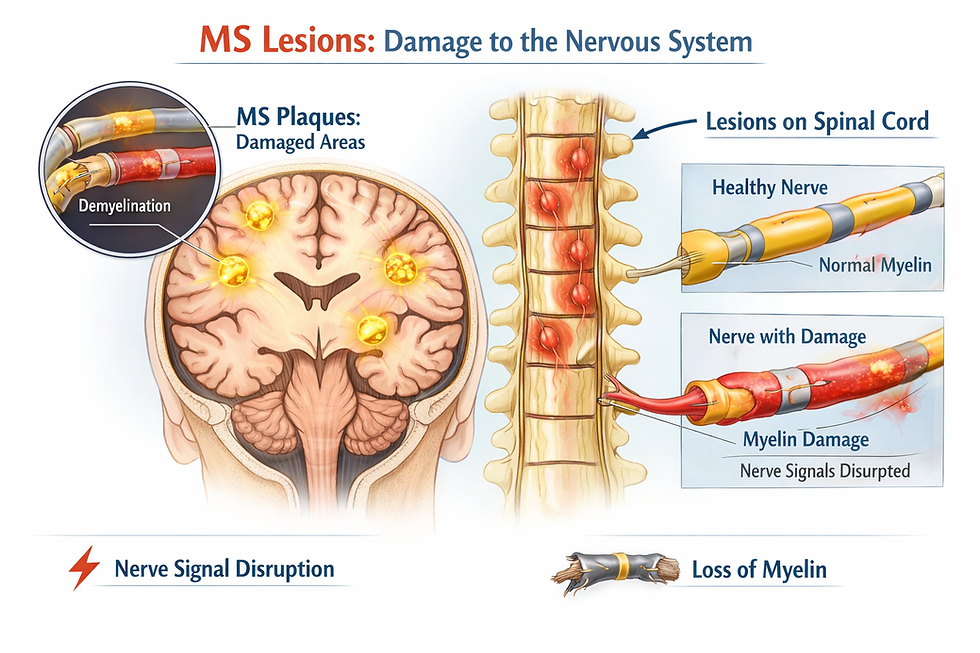Many Causes, Many Solutions: A Smarter Way to Think About MS and Your Health
- Aishwariya Farahi
- Apr 5
- 4 min read
If there’s one thing I’ve learned over the last few decades of living with MS—and working with thousands of people diagnosed with it—it’s this: MS is not a one-size-fits-all condition. Yet the traditional approach to healthcare still tends to treat it that way. The idea that every disease has a single cause and a single cure? That model is outdated. We’re living in a time where the science—and the reality—is far more complex, nuanced, and, frankly, hopeful.
I’ve always been fascinated by the history of medicine. It’s filled with brave souls who challenged the status quo and, for a time, paid the price. The doctor who suggested washing hands between autopsies and deliveries was ridiculed. Louis Pasteur, famous for germ theory, eventually admitted that it’s not just the germ—it’s the terrain of the host that matters most. And who can forget how long it took to accept that ulcers weren’t just from stress or spicy food, but caused by H. pylori bacteria?
Each of these examples reflects a massive shift in understanding. But shifts like these don’t happen overnight. There’s often a frustrating lag between when the evidence appears and when it makes its way into everyday care.
We’re in the middle of another one of these shifts right now.
The Problem with the One-Answer Approach
The current medical system is built around linear thinking: one symptom, one diagnosis, one treatment. It’s efficient, yes. But it’s also simplistic. The deeper truth is that health—and disease—exist in a web of causes and influences. For people with MS, this narrow view can feel especially limiting. You’re offered a drug (or several), maybe given a handout, and wished good luck.
This one-size-fits-all model not only underestimates the complexity of the disease, it sidelines the person experiencing it. That’s you. That’s me.
But there’s good news. The narrative is changing.
Science Is Catching Up to What Many of Us Already Knew
Open any reputable journal or even glance at recent covers of TIME Magazine, and you’ll see it: a revolution in how we understand chronic disease is well underway. In the MS space, we now have evidence connecting MS to:
Chronic inflammation
Gut permeability and the microbiome
Mitochondrial dysfunction
Toxic exposures
Nutritional deficiencies
Stress and trauma
Neuroplasticity
Epigenetics
Each of these areas offers a potential entry point for healing—not because they’re the one and only cause, but because MS is the outcome of many small imbalances accumulating over time.
And that means: there are many ways to move toward health.
What Does This Mean for You?
It means your diagnosis is not your destiny. It means the future is not fixed. And it means that you get to be an active participant in your own care.
This is the essence of the "many causes, many solutions" mindset. It asks new questions. It looks beyond the prescription pad. It empowers you to:
Ask why your symptoms started when they did
Explore how your lifestyle, nutrition, or past experiences might play a role
Look at stress—not just as an inconvenience, but as a key player in inflammation and immune function
Consider how sleep, movement, connection, and purpose shape your body’s ability to restore balance
But Wait—Why Isn’t This Mainstream Yet?
The truth? Medical dogma changes slowly. New ideas are often met with skepticism—even when they’re backed by robust evidence. Sometimes, it takes a generation for new thinking to be fully adopted.
That’s why many of the insights that could help you the most may not show up in your neurologist’s office anytime soon. But they are out there. And you don’t need to wait.
You’re Not Powerless in This
In fact, one of the most exciting parts of my clinical work—and of the Transform MS program—is seeing people reclaim their sense of agency. Whether you’re newly diagnosed or years into the journey, you can:
Learn how your body responds to different foods or environments
Discover how mindfulness, meditation, and breathwork impact your symptoms
Understand the relationship between your gut health and brain fog
Build a health strategy rooted in curiosity, commitment, and self-compassion
It’s not always easy. But it’s possible. And it’s happening right now.
A Shift Is Already Underway
Healthcare consumers—you—are more informed than ever. Thanks to the internet (and yes, that comes with its own challenges), people are questioning, researching, and seeking out options beyond the conventional model.
I’ve seen this firsthand. As a naturopathic doctor and certified functional medicine practitioner, I’ve worked with countless individuals who are done waiting. They want to feel better. They want options. And they want someone who will listen.
That’s why I do what I do.
This Is Your Invitation
If you’ve ever felt dismissed or discouraged… if you’ve ever sensed that there had to be more to the story of MS than just medication… if you’re ready to step off the sidelines and into a more active role in your care—you’re not alone.
Part of what I bring to Transform MS—and to every private consultation—is this deeper, broader, and more hopeful view of health. Not magical thinking. Not false promises. Just a clear understanding that multiple pathways to healing exist, and you can begin wherever you are.
So let’s keep asking questions. Let’s keep learning. And let’s keep moving—together—toward a model of care that respects the full complexity of who you are.
Because there’s no single cause of MS. And there’s no single solution. But there are countless ways to start feeling better.
Let’s explore them.




Comments